While 2016 is ending on an admittedly not-so-awesome note, this has also been a year of incredible victories for our movement to move beyond dirty fuels. These victories demonstrate that people power can and will defeat even the most daunting foes and that, when we stand together, we can accomplish even the most unlikely victories. These victories can help sustain us over the years to come. And we can take from them the lesson that we are not alone in our struggles for justice, equity and a healthy environment - if you’re reading this, and you’re worried about how you will protect your children’s health, or our climate, or your very right to live in peace without the violence of bigotry or fascism - know that you are not alone. There is a growing progressive movement in this country that has garnered countless successes over the past year, and while, yes, we face potentially unprecedented hurdles ahead, we are strong, and will not go silently into the night. We will stand together and deepen our resolve to secure the world we believe in.
To bolster us through the coming weeks and months, we’ve put together a retrospective of some of the successes this movement has helped secure over the past 12 months. The Sierra Club’s Beyond Dirty Fuels team has been proud to be a part of this growing movement, working with an increasing number of partner organizations and nearly all of our chapters around the country. I am proud to share that the Beyond Dirty Fuels team activated Sierra Club members and supports to take nearly one million actions with us to keep fossil fuels in the ground in 2016, either online or in the streets. We generated more than 170,000 phone calls from Sierra Club members and supporters to the White House and other target decision-makers, and secured more than 5,000 rsvps to attend physical events.
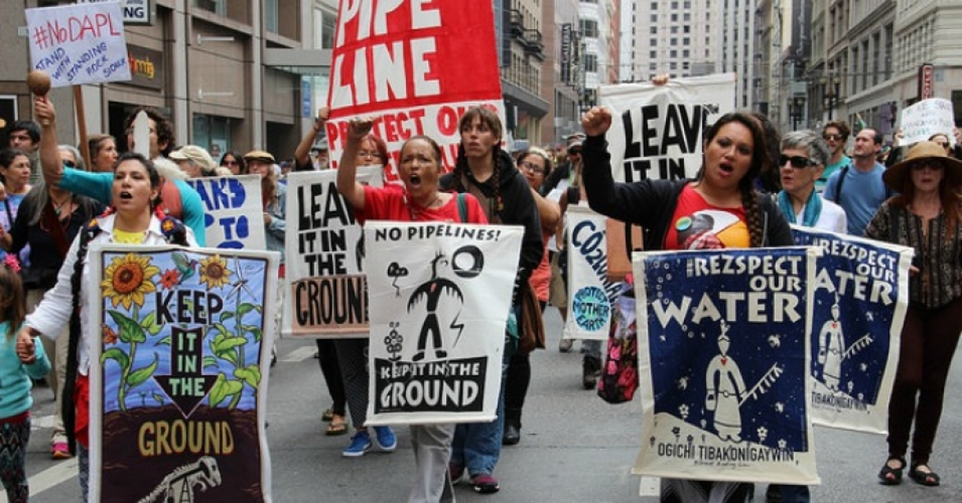
Water Protectors rally against the Dakota Access pipeline.
The media has also taken notice of this growing anti-fossil fuels, climate justice movement. First appearing in the media in 2012, the message "keep dirty fuels in the ground" has gained prominence, appearing in only 500 news articles in 2012 but increasing up to approximately 5,000 in 2016. The usage of the messaging frame continues to grow at an expeditious rate, confirming that the grassroots power that began this movement is not going away.
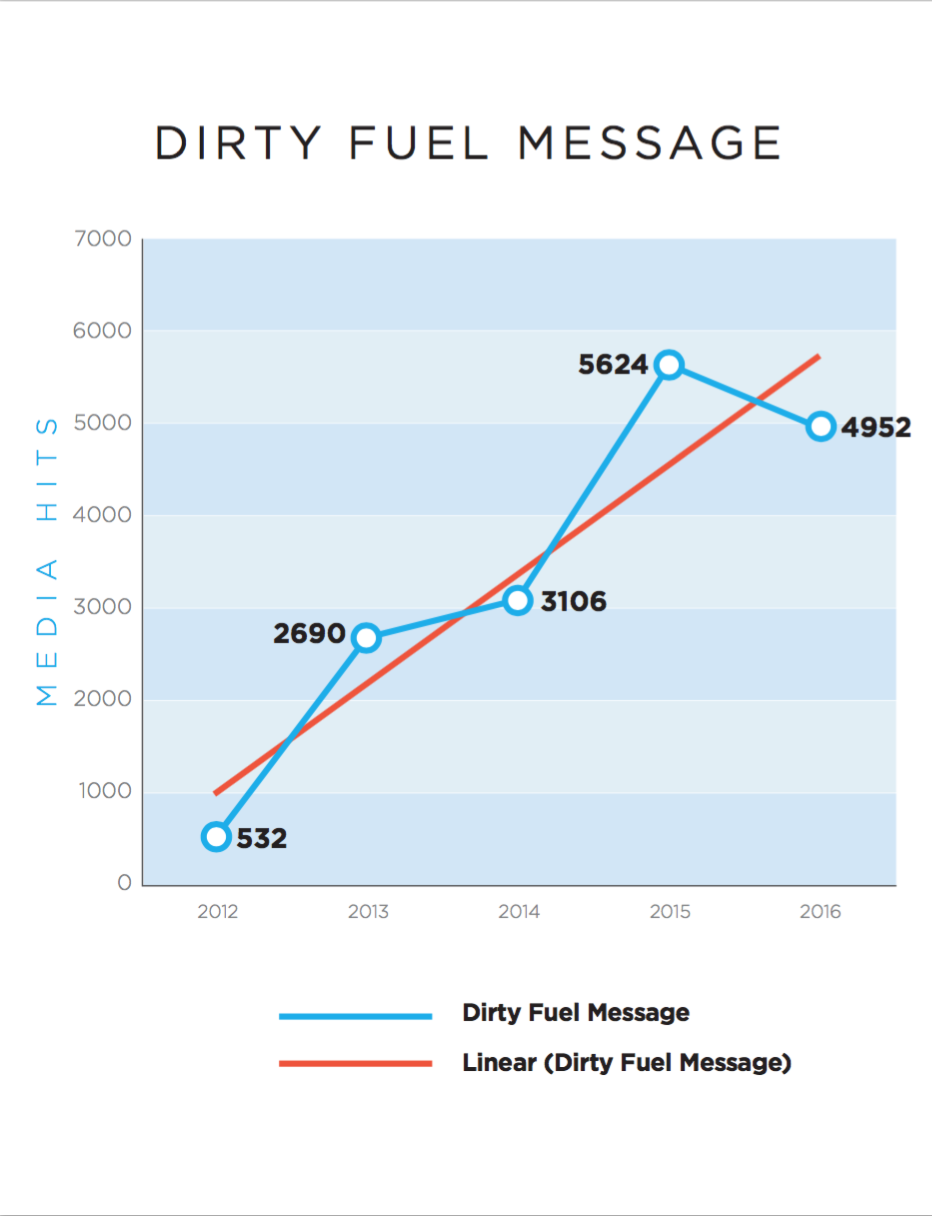
This movement has also stopped fossil fuel projects in their tracks. Responding to the mounting science indicating that if we are going to avoid a climate catastrophe we will need to keep the vast majority of fossil fuels in the ground, and to the desire of communities to protect themselves from the threats of pollution and spills associated with fossil fuel infrastructure, we have helped stop many of these dangerous fossil fuel projects in their tracks and have pushed for more transparent and robust reviews on dozens more. This includes:
Pipelines
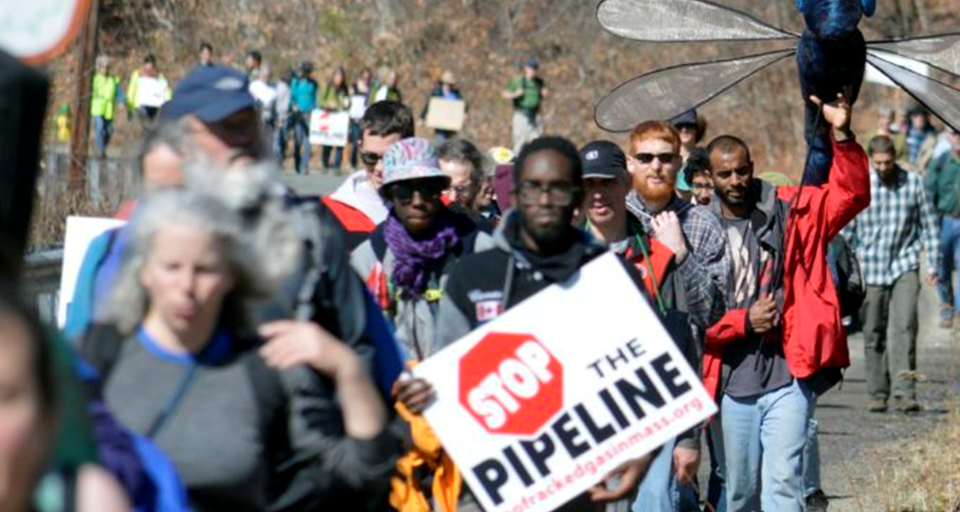
New Englanders rally against fracked gas pipelines.
In 2016, the dirty fuels campaign has contributed to efforts to successfully block four fossil fuel pipelines. These include:
Northeast Energy Direct pipeline - cancelled on 4/20/16. Kinder Morgan shelved this huge pipeline project citing insufficient market demand and public opposition. The Sierra Club’s Environmental Law Program helped our Northeast chapters intervene in and comment on the FERC docket.
Constitution fracked gas pipeline - rejected 4/22/16. New York Governor Cuomo rejected a necessary 401 water quality certification permit for this pipeline that would’ve brought fracked gas from Pennsylvania across New York. This is likely a final blow for this pipeline, which faced heightened scrutiny and opposition over the years its application has been before federal and state decision-makers. Horrifically, last month the company used eminent domain in Pennsylvania to go in and cut trees along the right-of-way, including syrup trees on the Hollerans’s property, even though they didn’t have all necessary permits.
Pacific Connector LNG pipeline - rejected 3/12/16. This pipeline, which would’ve carried liquefied natural gas to the Jordan Cove LNG export facility in OR, was rejected when FERC said no to the project in March. This rejection cited the landowner opposition to the pipeline, where our chapter and organizers had worked with members of the community to say no to the company’s purchasing of easements on their land to construct the pipeline.
Sandpiper Pipeline - cancelled 9/2/16. Working with tribal allies in the White Earth Nation and Honor the Earth, along with a broad environmental coalition, Sierra Club supported the efforts that led to the withdrawal of Enbridge’s application to the Minnesota Public Utilities Commission for the Sandpiper fracked oil pipeline through the state in the fall of 2016.
We have also worked with broad coalitions to secure more robust and transparent reviews and to increase public participation and comment on a number of oil and gas pipelines. These include:
The Dakota Access Pipeline and support Standing Rock: Sierra Club stood in solidarity with the Standing Rock Sioux and indigenous Water Protectors to stop the Dakota Access Pipeline. The Obama Administration halted the project in order for an Environmental Impact Statement to be done on December 5th. Sierra Club played a strong organizing role in two national days (one in September and one in November 2016) of action where tens of thousands of people across the country turned out to hundreds of events to call on the President to intervene on the project before he did so in December 2016. This issue generated unprecedented interest in our action alerts and call-in days, with more than 120,000 people taking action to send letters to the White House and more than 20,000 to making a phone call. Separately, through SierraRise -- the Sierra Club’s three-year-old experimental email lab -- we successfully activated 53,177 activists around this issue, one of the project's highest performing actions this year.
Enbridge’s Line 3 and Line 66 pipeline expansion and reroute in Wisconsin and Minnesota: Working with our chapters, we turned out our members and supporters to comment and submitted technical comments during the scoping period. Our engagement is ongoing with a draft EIS expected in MN in April 2017. The MN Public Utilities Commission (PUC) and MN Dept of Commerce have indicated that they will postpone the release of the draft EIS for the Line 3 tar sands pipeline -- and cited receiving a large volume of comments -- 1,300 total and the Sierra Club submitted more than 1,000 of those! To help educate the public on the impacts of these tar sands projects, we partnered with ally groups to release Enbridge Over Troubled Water -- The Enbridge GXL System’s Threat to the Great Lakes in February 2016. As part of this effort, we also released a digital ad in Wisconsin on tar sands pipelines that had more than 1 million total views when it ran, with more than 1,700 people clicking through to the action alert it linked to. Finally, we supported the formation of the landowner-driven Wisconsin Easement Action Team (WEAT) in fall of 2016 to bring together landowners fighting the Line 66 tar sands pipeline in the state.
PennEast Pipeline. Working with our PA and NJ chapters, we successfully pressured the Delaware River Basin Commission to conduct an independent assessment of the PennEast pipeline. We also helped turn out hundreds of people to the FERC hearings on the project in the summer of 2016.
Atlantic Sunrise gas pipeline. Our attorneys have filed litigation against this pipeline, highlighting the significant environmental justice impacts this project and the associated gas extraction and compressor stations would take on communities in its path. Working with our Pennsylvania Chapter, we also filed detailed comments, turned people out for hearings, met with lead and coordinating agencies, and asked for a supplemental environmental impact statement to be conducted.
Atlantic Coast gas pipeline. Our Virginia and West Virginia Chapters have been leading the charge against this massive fracked gas pipeline, which would cut across West Virginia, Virginia and North Carolina to feed Dominion and Duke’s mounting gas habit. We have filed suit against this project, filed an anti-trust complaint with the Federal Trade Commission, offered comments, and helped push the Forest Service to reject the original permit for the initial route.
Mountain Valley gas pipeline. Working with our Virginia and West Virginia Chapters, we have also been fighting this massive line, which would carry fracked gas across the two states, and we helped turn hundreds of people out to hearings on the project just before the election.
Sabal Trail gas pipeline. Our Georgia and Florida chapters led the charge against this line, which would carry fracked gas across Alabama, Georgia and into Florida, to feed the numerous new gas fired power plants proposed there, and our lawyers are currently engaged in litigation against the project, highlighting its significant environmental justice impacts and pointing to the region’s dangerous and irresponsible over-reliance on gas.
Mariner East pipeline. Working with our Pennsylvania chapter, we organized community members and landowners to turn out to hearings and oppose the Mariner East pipeline, which would carry natural gas liquids across the southern portion of Pennsylvania.
Oil train facilities.
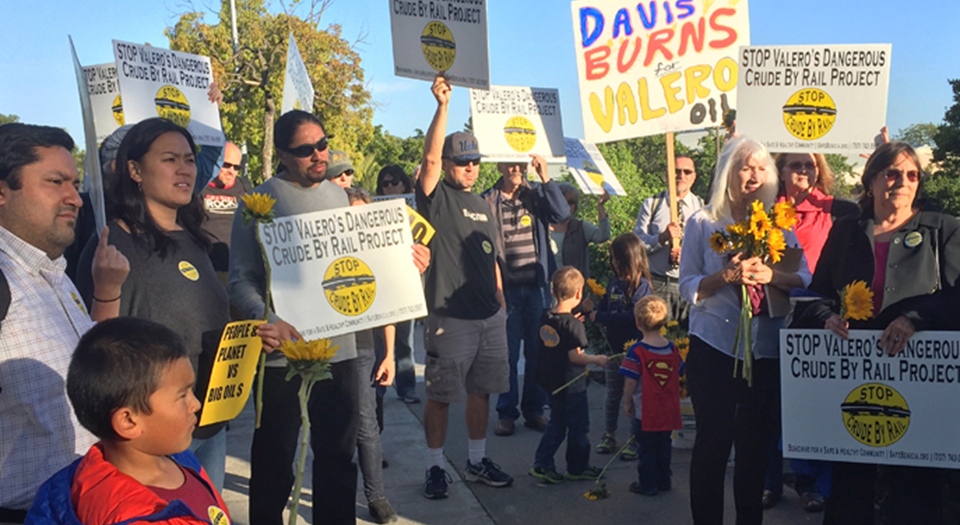
Community members meet before a hearing on Valero’s proposed crude by rail facility in Benicia, CA, which was later rejected.
Working with diverse coalitions, we succeeded in halting six crude-by-rail facilities on the West Coast:
Valero’s Benicia, California facility - denied 9/21/16. Working with allies like Stand and Communities for a Better Environment, we helped defeat Valero’s proposed crude-by-rail project in Benicia, CA after multiple years of campaigning. This facility would have brought up to 3 million gallons of extreme, dirty fuels to the facility each day. The San Francisco Chronicle reports that this win “could reverberate across the country.” Just prior to the vote, we helped secure a federal Surface Transportation Board ruling affirming the authority of local governments to deny dangerous crude-by-rail infrastructure projects slated for their communities (Benicia Independent)
Phillips 66 San Luis Obispo, California facility - denied 10/5/16. San Luis Obispo County Planning Commission denied Phillips 66’s proposed crude-by-rail project after 3 years of campaigning. (San Luis Obispo Tribune) This facility would have brought up to 550 million gallons of volatile tar sands and Bakken crude to the facility each year;
Shell facility Anacortes, Washington - cancelled 10/6/16. Just following the release of the draft environmental review for the project, the company pulled the plug on plans for their expansion to Shell refinery in Anacortes, WA, thus crushing the chance of 6 more oil trains per week along Puget Sound. We leveraged the Mosier derailment to gain support, activists and grasstop voices as part of this effort.
Union Pacific rail terminal expansion plan, Wasco County, Oregon - denied 11/5/16. Following the derailment of a train in Mosier, OR we had a turnout of 200+ people to a hearing in the Columbia River Gorge, on the issue of Wasco County permitting Union Pacific to expand the rail tracks to accommodate increased CBR. The permit was denied!
Imperium facility, Gray’s Harbor, Washington - cancelled 1/6/16. After significant opposition at community meetings, Imperium (then REG) announced they would no longer pursue the projects. Our chapter and volunteers were active in outreach to our supporters in the area. We have leveraged that opposition to build strong alliances with Grays Harbor residents and Quinault nation to continue to oppose the last remaining oil train proposal in the area, which is in the 'wait and see' decision phase. We have generated considerable turn out to city council meetings on a regular basis, in the most conservative county in Western Washington.
US Development group, Gray’s Harbor, Washington facility - cancelled 3/31/16. After significant public opposition to similar proposals in the region, including efforts from the Sierra Club working in coalition with other environmental groups and tribal allies like the Quinault Nation, US Development Group cancelled plans to develop a crude by rail facility in Gray’s Harbor, WA.
We have also laid significant groundwork towards securing a rejection (hopefully soon!) of the Tesoro Savage oil train facility in Vancouver, WA from Governor Inslee. We turned out over 1000 people to the initial Vancouver hearing on Tesoro Savage in January, the largest CBR terminal proposed in the US, and later hundreds more during the month long adjudication process. As well, (as a coalition effort) we generated close to 300,000 comments on this project. Similarly, we have been part of the broad coalition effort to defeat the one remaining oil train terminal in the Gray’s Harbor region, the Westway terminal, which received over 100,000 public comments on the EIS. We hope a rejection for that project will come within the next several months.
Liquefied Natural Gas export terminals.
Our attorney, Nathan Matthews, has been diligently fighting LNG export terminals around the country for the past several years, along with our Texas Chapter and Oregon Chapter. We have successfully helped defeat two of these massive terminals and are currently litigating four others:
Jordan Cove LNG terminal and associated Pacific Connector Pipeline - rejected 3/12/16. FERC issued its first-ever rejection of an LNG terminal in March when it denied the proposal for the Jordan Cove LNG terminal and linked Pacific Connector Pipeline in Oregon. The denial stated the project was not in the public interest because benefits of the project did not outweigh harms, pointing specifically to potential negative impacts to landowners along the route of the pipeline. Thousands had commented on and rallied against this project, including many landowners along the route, the vast majority of which has refused to sign easement agreements with the company.
Oregon LNG terminal - cancelled 3/15/16. The cancellation of the Oregon LNG proposal came on the heels of FERC’s rejection of the Jordan Cove LNG terminal proposal. The company behind the Oregon project cited low prices and a lack of customers for their product, but opposition to the project had also delayed their ability to secure necessary state permits.
This growing movement also made significant progress over the past year towards stopping fossil fuel extraction on public lands and in communities.
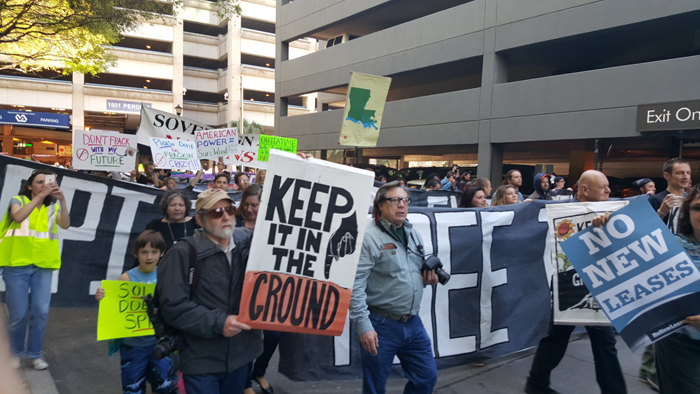
Rally against offshore drilling.
The Beyond Dirty Fuels campaign working with the burgeoning “keep it in the ground” movement to secure the following victories.
We worked with three communities to pass fracking bans:
6/7/16 Butte County, California voters banned fracking in their community after a two-year long volunteer-led effort (Chico Enterprise-Record)
7/19/16 the Alameda County California Board of Supervisors voted unanimously to ban fracking after a two-year volunteer-led campaign (Oakland Tribune)
12/9/16 Monterey County, California voters approved a ballot measure to ban fracking and new oil drilling, despite being outspent by Big Oil 30-1. (San Jose Mercury News)
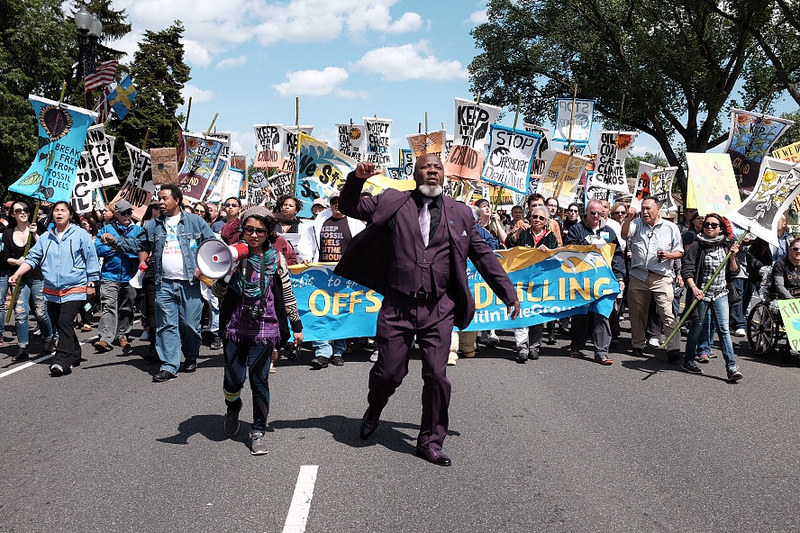
More than 1,000 people marched in Washington, D.C. against offshore drilling in May.
We worked to protect public land from oil and gas extraction:
We joined our coalition partners in legally protesting 39 proposed lease sales for oil and gas extraction on public lands, all around the country. We also supported Chapters in Wyoming, New Mexico, Utah, Texas and elsewhere in physically protesting these lease sales at BLM offices, elevating the need to keep dirty fuels in the ground and halt new leasing for oil and gas development.
We filed technical comments on an oil and gas fracking facility in a low-income community in Greeley, CO, which caused the project to be suspended indefinitely. We built a diverse coalition to challenge it in court if and when it is approved.
The Dirty Fuels campaign helped elevated the work of the New Mexico Chapter to halt expanded oil and gas extraction near Chaco Canyon in New Mexico, working with a diverse coalition including tribal allies and organizations, and succeeded in delaying potential lease sales for oil and gas
On Thursday, September 15th, we joined with the broader Keep it in the Ground coalition to gather at the White House to deliver more than one million signatures calling on President Obama to end fossil fuel leasing on public lands and oceans. The event took place one year after more than 450 climate groups and leaders first called upon the president to end the leasing program. Read our statement here.
In coordination with the Our Wild America’s Arctic Campaign, the Dirty Fuels Campaign, and chapters across the country turned out more than 1,000 people to call on the Obama Administration to protect the Atlantic, Arctic and Gulf in the 5-year plan at a rally in Washington DC (May 2016). We recruited thousands of people to hearings across the country to comment on the 5-year plan, including robust support for our chapters in the Gulf region.
We helped secure protections for the Arctic and Atlantic Oceans, successfully pressuring the Obama Administration to remove these areas from the 5 year offshore drilling plan. In support of this effort, we submitted more than 120,000 comments to the Bureau of Ocean Energy Management arguing for President Obama to protect the Arctic Ocean and the Gulf of Mexico like he protected the Atlantic Ocean during the comment period on the five-year offshore drilling plan. Our attorney also crafted Sierra Club technical comments on the impacts of the lease sales in the Gulf to this region’s environment and communities.
We worked with the City of San Francisco, which on November 29th unanimously passed a “Keep It in the Ground” ordinance, prohibiting fossil fuel extraction on city-owned land, and transitioning 800 acres of city-owned land in Kern County from oil fields to solar fields. (Sierra Club blog)
We secured protection of the Thompson Divide in Colorado by defending the Forest Service's management plan; we filed a lawsuit on the Bureau of Land Management’s (BLM) massive Colorado River Valley Management plan; filed suit on BLM's Powder River Basin Resource Management Plan RMP); we joined coalition suits on Chaco Canyon and Santa Fe lease sales in New Mexico; and filed or joined substantive comments on several other BLM and lease sales.
As part of our work to keep fossil fuels in the ground and protect communities from pollution from the oil and gas sector, we also worked to advance strong policies.
This work included efforts of our organizers, chapters, lobbyists, lawyers, and volunteers, advocating with policy makers and the federal, state and local level, and included the following victories:
Our campaign and federal policy staff worked closely with Congressman Jared Huffman (CA) on his Keep it in the Ground Act of 2016, which would prohibit new fossil fuel leasing on public lands.
We worked with a broad coalition of organizations to successfully encourage both the EPA and the BLM to propose and finalize strong regulations to reduce methane pollution from the oil and gas sector in 2016. Our organizers recruited 2,065 people to attend events specifically in support of methane standards, encouraged 1,561 grassroots activists to take a physical action with the campaign (like writing a letter to the editor, signing a postcard or attending a lobby visit), we helped lead visits with more than 50 Congressional offices, and we generated more than 100,000 comments in to the agencies on these rules. We also worked with the state of California to advance strong state methane standards - in June the California Air Resources Board released a draft state methane rule which, if finalized, will be the strongest in the nation, covering both new and existing sources of methane pollution. (Public News Service). We submitted 7,510 public comments on those rules.
The Sierra Club and our attorneys and campaign staff elevated the issue of Nationwide Permit 12, a permit that has allowed for pipelines to be fast-tracked for approval without adequate environmental review, and called on the Obama Administration to stop using it to fast track pipelines -- we submitted nearly 52,000 comments and technical comments in opposition to Nationwide Permit 12, and led an organizational sign-on letter in opposition to this fast track permitting process.
Our national staff and chapters offered testimony to the EPA’s Science Advisory Board, asking them to remove controversial language from their study on the impacts of fracking on drinking water - which they did upon release of the final study in December. See our press release on the issue here.
We helped secure a strong series of orders from the South Coast Air Quality Management District in January in response to the Aliso Canyon Gas Leak. While short of a full shut-down, we helped secure dozens of meaningful actions to protect the community. (Los Angeles Times). This advocacy also helped push Governor Brown to sign SB380 in May, extending a moratorium on new gas injection at the Aliso Canyon underground gas storage facility until regulators confirm the site is safe. (Sierra Club press release, Los Angeles Times)
In September, we worked with environmental justice organizations and the Blue Green Alliance to secure a vote by the Cal/OSHA Standards Board to strengthen California’s refinery safety regulations. The final regulations are pending. (Op-Ed in the SF Chronicle)
In November, we worked with Communities for a Better Environment to help secure a commitment from the Bay Area Air Quality Management District to evaluate placing a cap on greenhouse gas and particulate matter emissions from the region’s five sprawling oil refineries. (Sierra Club background, San Francisco Chronicle Op-Ed)
Our Federal Policy staff also led the way on several letters from members of Congress, encouraging them to take action on issues ranging from offshore drilling, the Dakota Access Pipeline, and Flint. We rallied Senators and Representatives to help protect our public lands from expanded drilling and we are proud to have fought for the removal of the Atlantic and Arctic from the President's five year offshore drilling plan. Overall, our Dirty Fuels Federal Policy efforts engaged hundreds of members of Congress in 2016.
Finally, our talented and creative attorneys filed litigation to protect communities and our environment from pollution, from fossil fuel extraction and transport, and in defense of strong policies. In 2016, our lawyers filed or continued work on 57 active cases and 22 Administrative filings related to dirty fuels; this litigation and legal work is a critical component of our campaigning. Here are some highlights from these efforts:
In February, we filed suit against three major companies in Oklahoma, linking their fracking injection wells to earthquakes. The suit received significant attention, and has helped highlight our Oklahoma Chapter’s ongoing work in the state to fight fracking and protect communities from the impacts of the oil and gas industry, including the more than 4000% increasing in earthquakes the state has seen over the past decade.
In November, we submitted our opening brief for our lawsuit, filed last December (Sierra Club blog) against Kern County, the #1 oil extracting county in the U.S., for permitting more than 70,000 new oil and gas wells over a 3,700 mile area over the next 20+ years without additional environmental review.
In September, we secured a victory when the Pennsylvania Supreme Court struck portions of Pennsylvania’s pro-fracking statute, which we had filed a joint amicus brief with other groups in the case, Robinson Township et al v. Commonwealth of Pennsylvania, against. The Supreme Court struck it down as violating either state or U.S. constitutions.
Nationally, we filed to intervene on behalf of the EPA methane rule, the BLM methane rule and BLM fracking rule, and that litigation is still pending.
We have been fighting numerous liquefied natural gas export facilities in the court, and recently filed against two additional facilities. While we have received disappointing decisions on some of these suits, we are optimistic that the courts will side with us on pending suits demanding that DOE assess the cumulative impacts of these massive projects.
As mentioned above, we have intervened or filed suit against many gas pipelines, including the Sabal Trail, the Atlantic Sunrise, the Atlantic Coast, the Constitution, the Northeast Energy Direct, the PennEast, the Pinelands and the Southern Reliability link pipelines. In our work, we have highlighted the need for more comprehensive assessment of the environmental justice impacts of these projects as well as better accounting of the climate impacts of these pipelines and the gas they would carry.
We have also filed suit against oil pipelines and oil train terminals. These include the Dakota Access pipeline, the Alberta Clipper tar sands pipeline, the Sandpiper pipeline and Enbridge’s Line 3. We have also used litigation to challenge several oil train terminals, including the Tesoro Savage facility in WA, the Port of Albany terminal expansion in NY, the Bakersfield terminal in CA, and the Richmond oil terminal in CA.
The campaign has worked with thousands of volunteers around the country and a growing and diverse network of partner organizations to stand up and say no to fossil fuel investments that threaten our climate and our communities. This network will be critical in the months and year ahead, as we must work to expand the clean energy solutions that will replace fossil fuels in our economy and provide alternative sources of income and employment for communities. We are excited to work with the Labor and Economic Justice Program in 2017 to advocate for investments in clean infrastructure projects that can do just that. So as we head into the next year, take heart from these victories and remember that people power can overcome even the greatest obstacles and win. I look forward to tackling the challenges ahead with you all!
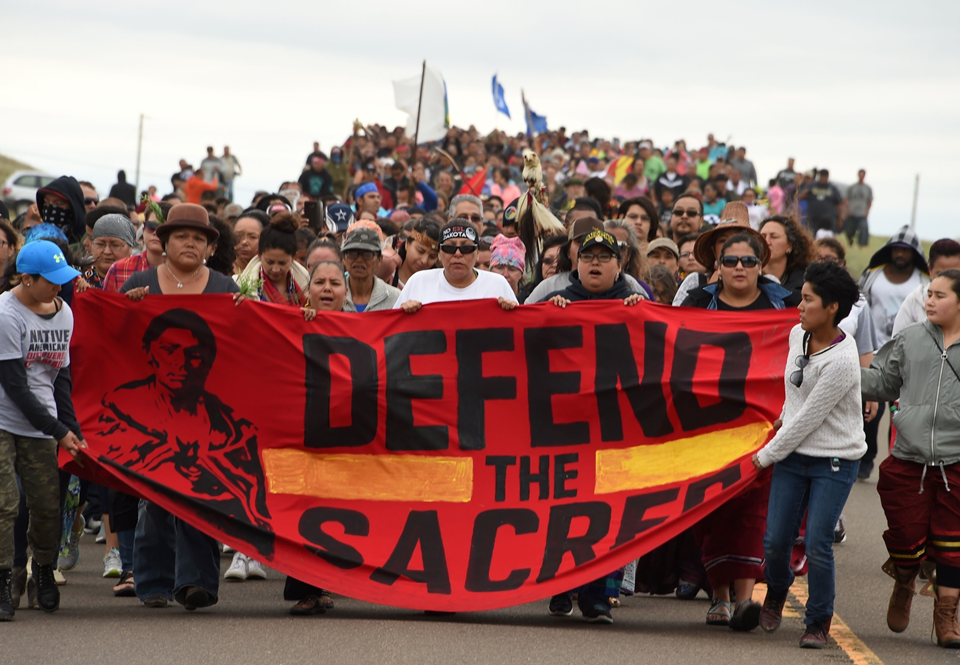
Water protectors gather near the route of the proposed Dakota Access pipeline.